Unit 3 My School Section B Vocabulary&Sentences课件 鲁教版(五四制)(2024) 六年级上册
文档属性
| 名称 | Unit 3 My School Section B Vocabulary&Sentences课件 鲁教版(五四制)(2024) 六年级上册 |  | |
| 格式 | pptx | ||
| 文件大小 | 29.9MB | ||
| 资源类型 | 试卷 | ||
| 版本资源 | 鲁教版 | ||
| 科目 | 英语 | ||
| 更新时间 | 2024-08-25 12:58:21 | ||
图片预览

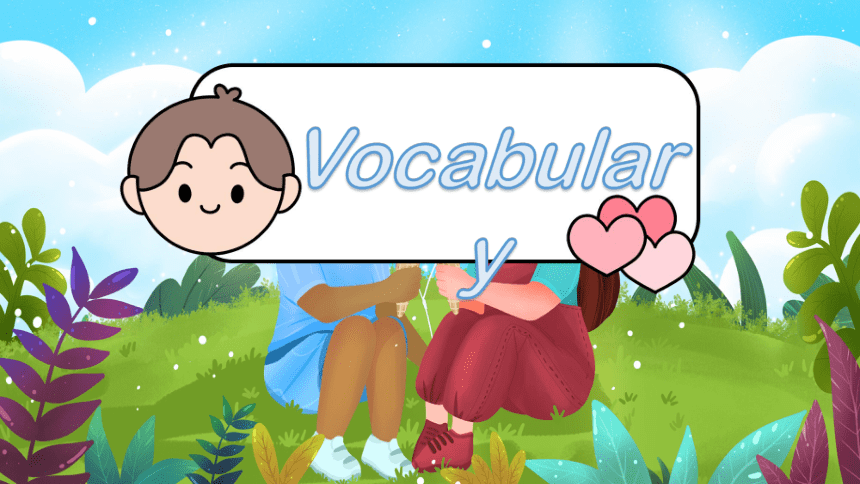
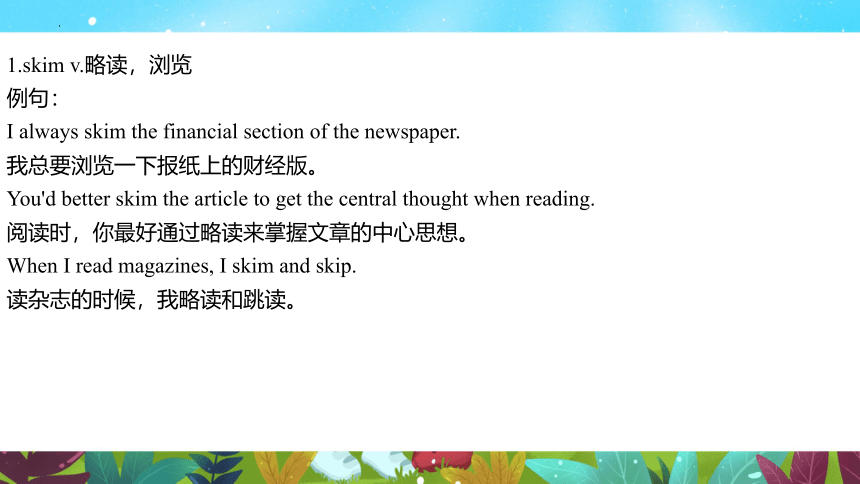
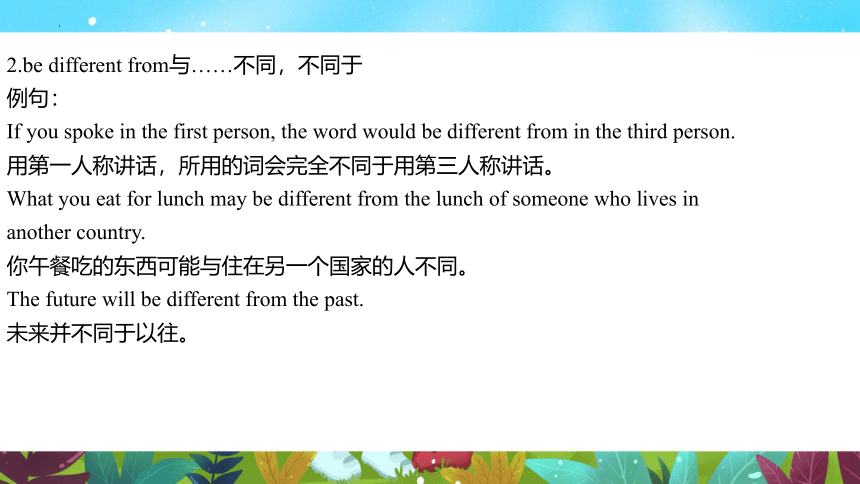

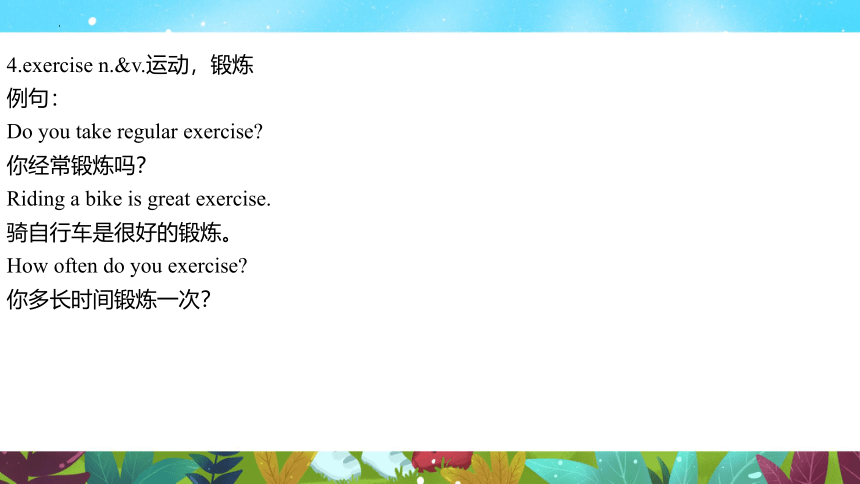
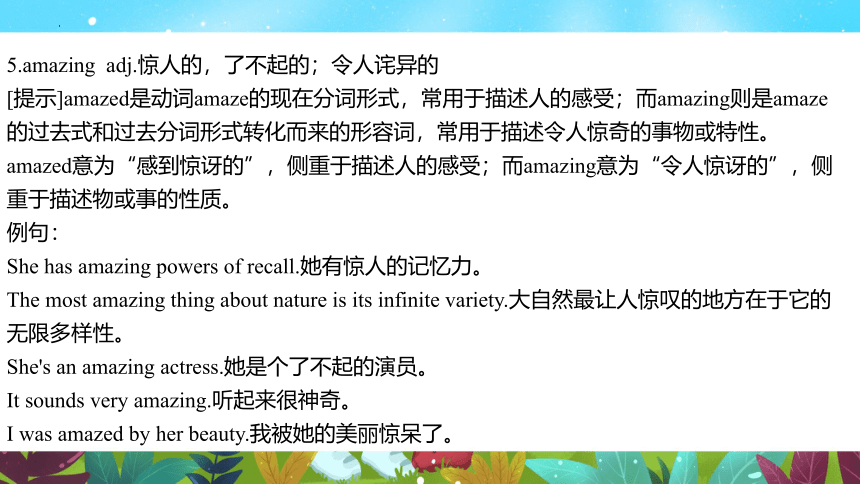
文档简介
(共18张PPT)
Unit 3 My School
Section B What fun things do you do at school
Vocabulary
1.skim v.略读,浏览
例句:
I always skim the financial section of the newspaper.
我总要浏览一下报纸上的财经版。
You'd better skim the article to get the central thought when reading.
阅读时,你最好通过略读来掌握文章的中心思想。
When I read magazines, I skim and skip.
读杂志的时候,我略读和跳读。
2.be different from与……不同,不同于
例句:
If you spoke in the first person, the word would be different from in the third person.
用第一人称讲话,所用的词会完全不同于用第三人称讲话。
What you eat for lunch may be different from the lunch of someone who lives in another country.
你午餐吃的东西可能与住在另一个国家的人不同。
The future will be different from the past.
未来并不同于以往。
3.modern adj.现代的; 现代派的;现代化的
例句:
He collects modern sculpture.
他收藏现代雕塑。
She is very modern in outlook.
她的看法很时髦。
I don't really go for modern art.
我并不是很喜欢现代艺术。
Greed is a disease of modern society.
贪婪是现代社会的恶疾。
The novel may become a modern classic.
这部小说可能会成为现代名著。
4.exercise n.&v.运动,锻炼
例句:
Do you take regular exercise
你经常锻炼吗?
Riding a bike is great exercise.
骑自行车是很好的锻炼。
How often do you exercise
你多长时间锻炼一次?
5.amazing adj.惊人的,了不起的;令人诧异的
[提示] amazed是动词amaze的现在分词形式, 常用于描述人的感受; 而amazing则是amaze的过去式和过去分词形式转化而来的形容词, 常用于描述令人惊奇的事物或特性。amazed意为“感到惊讶的”, 侧重于描述人的感受; 而amazing意为“令人惊讶的”, 侧重于描述物或事的性质。
例句:
She has amazing powers of recall.她有惊人的记忆力。
The most amazing thing about nature is its infinite variety.大自然最让人惊叹的地方在于它的无限多样性。
She's an amazing actress.她是个了不起的演员。
It sounds very amazing.听起来很神奇。
I was amazed by her beauty.我被她的美丽惊呆了。
6.raise v.提起,举起;;增加,提高;筹募,征集;提出,提起;饲养,种植;抚养,养育;
例句:
How can we raise standards in schools
我们怎样才能提高学校的水平?
She has been wrestling to raise the money all year.
她一年来一直在想方设法筹集这笔资金。
We have had to raise our prices because of rising costs.
因为成本日益上涨,我们不得不提高价格。
Don't you raise your voice to me!
别对我高声大气!
7.change v.改变,变化;更换,替换;n.变化,变革;找回的钱,零钱
例句:
Leaves change colour in autumn.
树叶在秋天改变颜色。
We can't change our plans now.
我们现在不能改变计划了。
We change our car every two years.
我们的车每两年更换一次。
Nothing will make me change my mind.
什么都不能让我改变主意。
Do you have change for five dollars
你有五元零钱吗?
8.send v.邮寄,发送;传达,告知;派遣
例句:
Do you want to send an E-mail
你想发一封电子邮件吗?
Shall I send you the book
我把书给你寄去,好不好?
I will send you a copy of the report.
我会把这个报告的复印本寄给你。
10.sound n.声音,声响;v.(使)发声,(使)作响;听起来像
[注意]当“sound”作为连系动词时, 其后常常接形容词来描述主语所发出的声音给人的印象。 例如, “The music sounds beautiful.”( 这音乐听起来很美。 ) 在这个句子中, “sound”连接了主语“The music”和表语“beautiful”, 描述了音乐给人的听觉感受。
例句:
You don't sound very sure.
听你这口气,你自己也不大肯定。
Your car doesn't sound very healthy.
你的车听声音好像不很正常。
Sound travels more slowly than light.声比光传播得慢。
I can hear the sound of running water.
我能听到流水的声音。
Sentences
1.It’s my favourite place because there are many kinds of food. 这是我最喜欢的地方,因为有很多种食物。
[句式解构] "because"引导的原因状语从句在句中用来说明主句的原因 。 这种从句通常由从属连词"because"引导, 表示主句动作发生的原因或理由12。
例如, 在句子“He walked slowly because of his injured leg ./He walked slowly because his leg was injured .”中, “because of his injured leg”和“because his leg was injured”就是原因状语从句, 用来解释“他走得很慢”的原因1。
在使用"because"引导的原因状语从句时, 需要注意从句的语序应该是正常的陈述语序, 即主语+谓语的结构。 同时, 也要注意主从句之间的逻辑关系, 确保从句能够正确地解释主句的原因或理由。
2.How about your school 你的学校怎么样?
[句式解构]
"How about"是英语口语中非常灵活且常用的句型, 主要用于提出建议、 询问意见或作为承接上下文的转折语 。 具体用法包括:
询问别人的意见或建议, 如: “How about going to the cinema tonight ”( 今晚去看电影怎么样 )。
提出自己的建议或想法, 如: “How about we go hiking this weekend ”( 这个周末我们去远足怎么样 ) 。
询问天气或身体状况, 如: “How about the weather in your city ”( 你城市的天气怎么样 ) 。
作为承接上下文的转折语, 如: “I'm a teacher. How about you ”( 我是老师。 你呢 ) 。
Exercises
补全对话
根据下面的对话情景,在每个空白处填上一个适当的句子,使对话的意义连贯、完整。
A: Hi, Kitty! You look unhappy. 1
B: It’s my neighbor. She sings all the time and her voice is loud and terrible. 2 .
A: That’s really a problem. How about staying longer to study at school
B: But I can’t. I will miss the school bus.
A: 3
B: Yeah.
A: You needn’t worry about it. You can study together with me after school and then take my dad’s car home. 4 .
B: Won’t it bring you too much trouble
A: Not at all. Your home is on our way.
B: Thanks a lot, Bob.
A: 5 .
【答案】
1.What’s wrong with you 2.I can’t study quietly at home 3.Do you need to take the school bus home 4.Then the problem can be solved 5.You’re welcome
【解析】本文是Bob给Kitty提供帮助的对话。
1.根据上文“You look unhappy.”可知,此处询问对方怎么了。故填What’s wrong with you。
2.根据上文“She sings all the time and her voice is loud and terrible.”和下文“How about staying longer to study at school ”可知,此处表示自己在家不能安静地学习。故填I can’t study quietly at home。
3.根据上文“I will miss the school bus.”和下文“Yeah.”可知,此处询问对方是否需要坐校巴回家。故填Do you need to take the school bus home。
4.根据上文“You can study together with me after school and then take my dad’s car home.”可知,此处表示问题解决了。故填Then the problem can be solved。
5.根据上文“Thanks a lot, Bob.”可知,此处回答不客气。故填You’re welcome。
Thanks!
Unit 3 My School
Section B What fun things do you do at school
Vocabulary
1.skim v.略读,浏览
例句:
I always skim the financial section of the newspaper.
我总要浏览一下报纸上的财经版。
You'd better skim the article to get the central thought when reading.
阅读时,你最好通过略读来掌握文章的中心思想。
When I read magazines, I skim and skip.
读杂志的时候,我略读和跳读。
2.be different from与……不同,不同于
例句:
If you spoke in the first person, the word would be different from in the third person.
用第一人称讲话,所用的词会完全不同于用第三人称讲话。
What you eat for lunch may be different from the lunch of someone who lives in another country.
你午餐吃的东西可能与住在另一个国家的人不同。
The future will be different from the past.
未来并不同于以往。
3.modern adj.现代的; 现代派的;现代化的
例句:
He collects modern sculpture.
他收藏现代雕塑。
She is very modern in outlook.
她的看法很时髦。
I don't really go for modern art.
我并不是很喜欢现代艺术。
Greed is a disease of modern society.
贪婪是现代社会的恶疾。
The novel may become a modern classic.
这部小说可能会成为现代名著。
4.exercise n.&v.运动,锻炼
例句:
Do you take regular exercise
你经常锻炼吗?
Riding a bike is great exercise.
骑自行车是很好的锻炼。
How often do you exercise
你多长时间锻炼一次?
5.amazing adj.惊人的,了不起的;令人诧异的
[提示] amazed是动词amaze的现在分词形式, 常用于描述人的感受; 而amazing则是amaze的过去式和过去分词形式转化而来的形容词, 常用于描述令人惊奇的事物或特性。amazed意为“感到惊讶的”, 侧重于描述人的感受; 而amazing意为“令人惊讶的”, 侧重于描述物或事的性质。
例句:
She has amazing powers of recall.她有惊人的记忆力。
The most amazing thing about nature is its infinite variety.大自然最让人惊叹的地方在于它的无限多样性。
She's an amazing actress.她是个了不起的演员。
It sounds very amazing.听起来很神奇。
I was amazed by her beauty.我被她的美丽惊呆了。
6.raise v.提起,举起;;增加,提高;筹募,征集;提出,提起;饲养,种植;抚养,养育;
例句:
How can we raise standards in schools
我们怎样才能提高学校的水平?
She has been wrestling to raise the money all year.
她一年来一直在想方设法筹集这笔资金。
We have had to raise our prices because of rising costs.
因为成本日益上涨,我们不得不提高价格。
Don't you raise your voice to me!
别对我高声大气!
7.change v.改变,变化;更换,替换;n.变化,变革;找回的钱,零钱
例句:
Leaves change colour in autumn.
树叶在秋天改变颜色。
We can't change our plans now.
我们现在不能改变计划了。
We change our car every two years.
我们的车每两年更换一次。
Nothing will make me change my mind.
什么都不能让我改变主意。
Do you have change for five dollars
你有五元零钱吗?
8.send v.邮寄,发送;传达,告知;派遣
例句:
Do you want to send an E-mail
你想发一封电子邮件吗?
Shall I send you the book
我把书给你寄去,好不好?
I will send you a copy of the report.
我会把这个报告的复印本寄给你。
10.sound n.声音,声响;v.(使)发声,(使)作响;听起来像
[注意]当“sound”作为连系动词时, 其后常常接形容词来描述主语所发出的声音给人的印象。 例如, “The music sounds beautiful.”( 这音乐听起来很美。 ) 在这个句子中, “sound”连接了主语“The music”和表语“beautiful”, 描述了音乐给人的听觉感受。
例句:
You don't sound very sure.
听你这口气,你自己也不大肯定。
Your car doesn't sound very healthy.
你的车听声音好像不很正常。
Sound travels more slowly than light.声比光传播得慢。
I can hear the sound of running water.
我能听到流水的声音。
Sentences
1.It’s my favourite place because there are many kinds of food. 这是我最喜欢的地方,因为有很多种食物。
[句式解构] "because"引导的原因状语从句在句中用来说明主句的原因 。 这种从句通常由从属连词"because"引导, 表示主句动作发生的原因或理由12。
例如, 在句子“He walked slowly because of his injured leg ./He walked slowly because his leg was injured .”中, “because of his injured leg”和“because his leg was injured”就是原因状语从句, 用来解释“他走得很慢”的原因1。
在使用"because"引导的原因状语从句时, 需要注意从句的语序应该是正常的陈述语序, 即主语+谓语的结构。 同时, 也要注意主从句之间的逻辑关系, 确保从句能够正确地解释主句的原因或理由。
2.How about your school 你的学校怎么样?
[句式解构]
"How about"是英语口语中非常灵活且常用的句型, 主要用于提出建议、 询问意见或作为承接上下文的转折语 。 具体用法包括:
询问别人的意见或建议, 如: “How about going to the cinema tonight ”( 今晚去看电影怎么样 )。
提出自己的建议或想法, 如: “How about we go hiking this weekend ”( 这个周末我们去远足怎么样 ) 。
询问天气或身体状况, 如: “How about the weather in your city ”( 你城市的天气怎么样 ) 。
作为承接上下文的转折语, 如: “I'm a teacher. How about you ”( 我是老师。 你呢 ) 。
Exercises
补全对话
根据下面的对话情景,在每个空白处填上一个适当的句子,使对话的意义连贯、完整。
A: Hi, Kitty! You look unhappy. 1
B: It’s my neighbor. She sings all the time and her voice is loud and terrible. 2 .
A: That’s really a problem. How about staying longer to study at school
B: But I can’t. I will miss the school bus.
A: 3
B: Yeah.
A: You needn’t worry about it. You can study together with me after school and then take my dad’s car home. 4 .
B: Won’t it bring you too much trouble
A: Not at all. Your home is on our way.
B: Thanks a lot, Bob.
A: 5 .
【答案】
1.What’s wrong with you 2.I can’t study quietly at home 3.Do you need to take the school bus home 4.Then the problem can be solved 5.You’re welcome
【解析】本文是Bob给Kitty提供帮助的对话。
1.根据上文“You look unhappy.”可知,此处询问对方怎么了。故填What’s wrong with you。
2.根据上文“She sings all the time and her voice is loud and terrible.”和下文“How about staying longer to study at school ”可知,此处表示自己在家不能安静地学习。故填I can’t study quietly at home。
3.根据上文“I will miss the school bus.”和下文“Yeah.”可知,此处询问对方是否需要坐校巴回家。故填Do you need to take the school bus home。
4.根据上文“You can study together with me after school and then take my dad’s car home.”可知,此处表示问题解决了。故填Then the problem can be solved。
5.根据上文“Thanks a lot, Bob.”可知,此处回答不客气。故填You’re welcome。
Thanks!
同课章节目录
